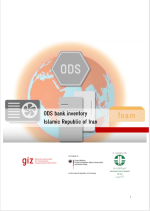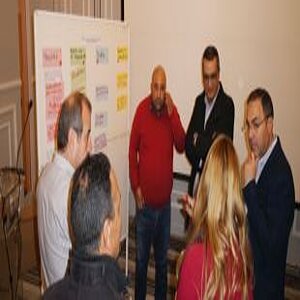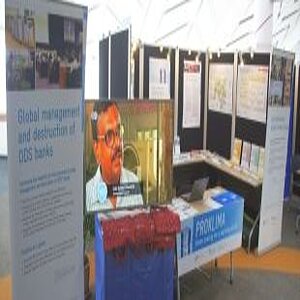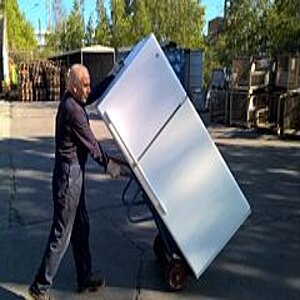Getting rid of ozone-depleting substances (ODS)
The management and disposal of existing ODS has been the focus of various events in recent months in order to raise awareness of the topic.
In the course of the 29th Meeting of the Parties to the Montreal Protocol held in November, around 60 policy-makers and representatives from the private sector and civil society participated in a side event which focused on the climate impact of ozone depleting substances (ODS) banks. ODS play a crucial environmental role. If released into the atmosphere, the chemical substances, which are mainly used in cooling appliances, deplete the ozone layer and contribute to global warming.
The IKI project Management and Disposal of Existing Ozone-Depleting Substances in ODS Banks aims to promote the reduction of emissions from ODS banks in partner countries and to raise awareness of the topic. A new study developed within the project and presented during the side event analyses the available consumption data from the Ozone Secretariat on ODS banks and describes the dimensions of global and regional banks. The potential climate impact of ODS banks of 9.9 GtCO2 eq. is alarming and calls for international action.
While it is projected that ODS banks will decline, hydrofluorocarbons (HFCs) banks will increase. Since the ODS in developing countries are replaced by HFC with high global warming potential until 2030, the overall emission of ODS and HFC banks will remain at a high level, with annual average emissions of around 200 Mt CO2 eq in developing countries. This is equivalent to the amount of CO2 emissions generated by the largest German lignite-fired power plant in six years.
Proper end-of-life ODS and HFC management and destruction is not regulated under the Montreal Protocol. Against this backdrop, the IKI project has produced a short movie on this unseen environmental threat. The clip aims to inform policy-makers about this problem and raise awareness of the major climate and ozone damage caused by emissions from old equipment. This cross-cutting issue concerns not only ozone and climate protection, but also waste and energy, and is an important, often ignored topic.
The movie was first broadcast during the World Resource Forum (WRF) in Geneva in October 2017. The WRF serves as a platform for fostering knowledge exchange on resources management amongst business leaders, policy-makers, NGOs, scientists and the public. Out of 60 submissions, the recent Manual Dismantling of Refrigerators and Air Conditioners published by the IKI project was selected for presentation during the scientific sessions of the WRF.
Following the scientific sessions, GIZ Proklima organised a workshop on ODS bank management, including two case studies from the Environmental Protection Agency (EPA) Ghana and Ministry of Environment and Sustainable Development of Colombia (MADS Colombia). MADS Colombia presented the successful implementation of ODS bank management, collection, recovery and destruction of substances and old equipment in Colombia (starting with domestic refrigerators) and their awareness raising campaigns for the civil society. EPA Ghana showcased the public and private sector negotiations and actions on ODS waste management, particularly for foams from old fridges, as well as the financing and regulatory framework. Ghana also highlighted the country's progress achieved with regard to tax exemptions for the import of ozone friendly substances and products.
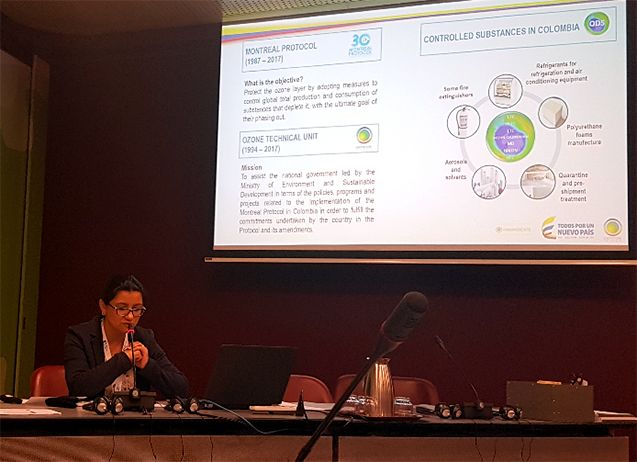
The participation of the two policy-makers from Ghana and Colombia at the WRF was integrated into a study tour through Switzerland, which included meetings with political and industrial institutions as well as two company visits. The tour, organised by the IKI project and implemented by GIZ Proklima, aimed to expose the partner countries to high-end technology in the field of waste management and initiative technical exchange.
Within the framework of the project, a series of publications on ODS bank management as well as the manual dismantling of refrigerators and air conditioners have been published and are now available in the <link en media-centre publications>publications section of the IKI website.
The link has been copied to the clipboard
Contact
IKI Office
Zukunft – Umwelt – Gesellschaft (ZUG) gGmbH
Stresemannstraße 69-71
10963 Berlin





